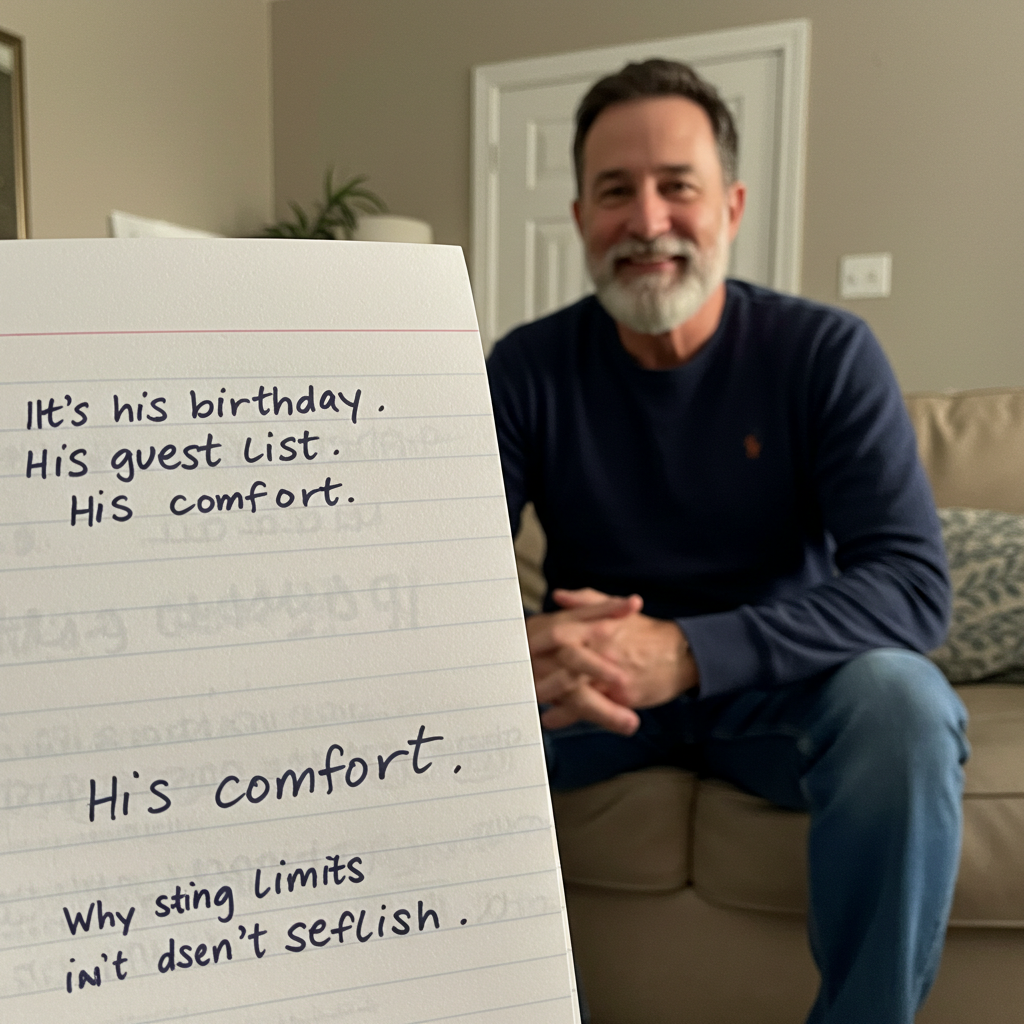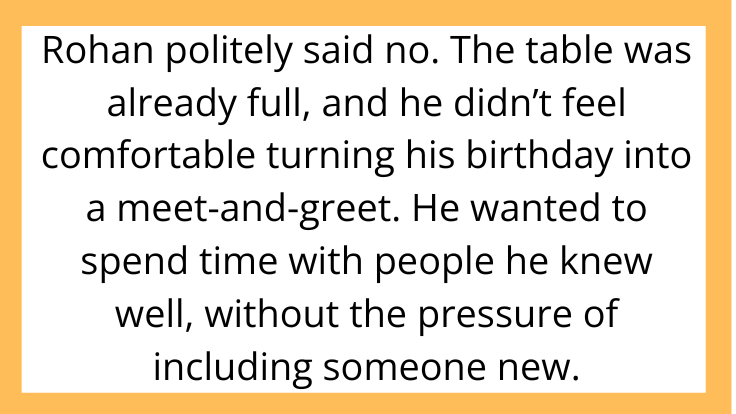AITAH for Not Letting My Brother Bring His Girlfriend to My Birthday Dinner?
Birthdays are meant to be special—especially when you’re planning a close, intimate dinner with the people who matter most. But what happens when a sibling wants to bring someone you barely know, and your “small gathering” turns into a source of tension?
In today’s AITAH scenario, one brother’s request turns into a family argument. Let’s dive into the drama and ask: who’s really out of line here?
The Background: A Carefully Planned Dinner

The original poster (we’ll call him Rohan) is a 26-year-old who planned a birthday dinner at a cozy restaurant with limited seating. He reserved a table for eight—inviting his closest friends and immediate family. It wasn’t meant to be a party, just an intimate get-together with the people he genuinely enjoys spending time with.
Enter his older brother, Aman.
Aman texted a few days before the dinner asking if he could bring his new girlfriend—someone none of the family had met before. They’d only been dating for about a month.
Rohan politely said no. The table was already full, and he didn’t feel comfortable turning his birthday into a meet-and-greet. He wanted to spend time with people he knew well, without the pressure of including someone new.
The Fallout: “You’re Being Inconsiderate”

Aman didn’t take it well. He accused Rohan of being disrespectful and controlling. He said it was unfair to exclude his girlfriend and that if she couldn’t come, he wouldn’t either.
The rest of the family got involved. Rohan’s parents thought he should “be more flexible” and that it was “just one more person.” But his friends supported his decision and told him he had every right to decide who attended his own celebration.
Now, Rohan’s wondering: AITAH for saying no to my brother’s girlfriend coming to my birthday dinner?
The Case for Rohan: Boundaries Matter

Rohan wasn’t hosting a large party—this was a small, reservation-only dinner. When someone curates a specific list of people for a limited setting, they’re allowed to draw the guest list line.
-
Personal Comfort: Rohan didn’t feel close to the girlfriend. It’s not about disliking her—it’s about prioritizing comfort and connection.
-
Planning Limits: Restaurants often have strict guest caps. One extra person means rearranging tables or excluding someone else.
-
It’s His Birthday: Ultimately, it’s his day. He should be surrounded by people he feels happiest with.
As one commenter on the original post put it:
“Inviting someone to a birthday dinner isn’t an obligation—it’s a choice. You’re not required to host plus-ones you’re not comfortable with.”
The Case for Aman: Relationships Deserve Respect

Aman’s perspective isn’t entirely unreasonable. From his side, he wanted to include his girlfriend in family events, show her he cares, and begin blending her into his life. Being told “no” may have felt like a rejection of both her and their budding relationship.
-
New Relationships Need Support: Including his girlfriend might’ve made her feel welcomed and respected.
-
Family Is Evolving: As people grow older, families change. Partners become permanent fixtures, and flexibility becomes important.
That said, the manner in which Aman reacted—by threatening not to come and involving the whole family—shifted the conversation from inclusion to entitlement.
A Deeper Issue: Control or Consideration?

This isn’t just a story about one dinner. It’s a story about boundaries, expectations, and the friction that can arise when people assume they’re entitled to override someone else’s plans.
Rohan didn’t say she could never come to any family event. He simply said that this dinner wasn’t the right time. That’s not controlling—it’s considerate of the vibe he envisioned for his birthday.
Aman, on the other hand, chose to make it about himself. Instead of understanding the context, he escalated the situation and involved others to pressure Rohan.
How Could This Have Been Handled Better?

If You’re in Rohan’s Shoes:
-
Be clear and kind about your boundaries.
-
Offer an alternative: “Let’s plan a lunch soon where I can meet her properly.”
-
Don’t backpedal to keep the peace—stand by your decision calmly.
If You’re in Aman’s Shoes:
-
Understand that not every event is the right time to introduce someone new.
-
Avoid ultimatums—they rarely help your case.
-
Respect someone else’s right to plan their own celebration their way.
Final Verdict: Not the Villain

Most commenters agreed: Rohan is not the villain. He’s setting a personal boundary on his own birthday, not enforcing a lifelong exclusion.
Invitations are not obligations. Including someone in a meaningful event should feel right for the host—not forced by guilt or pressure.
So no, Rohan isn’t the bad guy. He’s just someone who wants his birthday to feel like home, not a social experiment.



